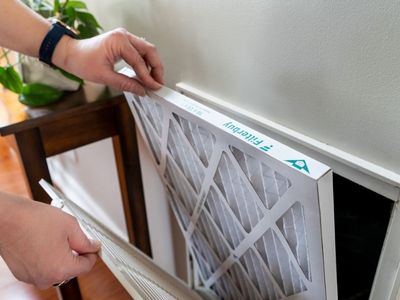
Learn About These Preventative Maintenance Tricks
As autumn approaches, everyone has pumpkin spice lattes and the holidays on their minds. They seldom give thought to how their HVAC adjusts to the new season––that is until the HVAC system malfunctions. Then, it's all homeowners can think about.
There are many things homeowners can do to ease the HVAC's transition from summer into fall. Even one of the following measures can save time, money, and stress. Some of those measures include:
Scheduling an Appointment with an HVAC Maintenance Professional
 The U.S. Department of Energy suggests that homeowners schedule annual appointments with HVAC maintenance professionals. These specialists employ a host of services when evaluating a heater or air conditioning system, such as:
The U.S. Department of Energy suggests that homeowners schedule annual appointments with HVAC maintenance professionals. These specialists employ a host of services when evaluating a heater or air conditioning system, such as:
- Checking the system's refrigerant levels
- Testing for any leaks using specialized equipment
- Evaluating the belts for any above-average wear-and-tear
- Measuring airflow
- Testing for any excess pollen, mold, or mildew growth
- Cleaning the coils
Most HVAC systems, with proper maintenance, last about 15 years. Having a professional service the unit can make it last even longer.
Change the Unit's Air Filter
 EnergyStar stresses the importance of changing the HVAC system's air filter. It notes that, for optimal usage, one should change the air filter once every three months––even if they don't notice anything different with their HVAC system. EnergyStar reports that if a home has a lot of occupants (especially furry friends), one should change the air filter even more often than tri-monthly.
EnergyStar stresses the importance of changing the HVAC system's air filter. It notes that, for optimal usage, one should change the air filter once every three months––even if they don't notice anything different with their HVAC system. EnergyStar reports that if a home has a lot of occupants (especially furry friends), one should change the air filter even more often than tri-monthly.
But why are air filters so important? Well, imagine the HVAC system like the home's respiratory system. Depending on the homeowner's preferences, it draws in air and makes it hot or cold. The air filter prevents hair, dust, dander, and other indoor pollutants from clogging up the system. When the air filter is clogged, the HVAC system can't breathe. This can:
- Make the home's air feel stagnant
- Prevent the thermostat from working properly
- Lead to higher-than-average energy bills
- Increase the home's energy usage
- Increase the home's humidity
- Lead to mold and mildew growth
A clogged air filter also strains the HVAC system, making it "live" shorter than it should.
Monitor the Home's Energy Usage
Problems with the HVAC system don't come out of nowhere. Usually, there are small signs that indicate a problem is brewing. One of those signs includes increased energy usage. Homeowners should have a rough understanding of how much their gas, water, and electricity bills are each month. Any deviation from the average bill could mean that the HVAC system is working longer than it should.
When the HVAC kicks into overdrive to regulate the home's indoor temperature, this can:
- Increase the likelihood of a fire
- Cause the AC system to short cycle
- Lead to higher and higher energy bills
- Put unreasonable strain on the heater and AC system
- Cause problems to occur more frequently
High energy bills do not equal high efficiency. They generally point to an underlying problem with the HVAC system, whether an old air filter or a worn belt.
About Chad's AC Direct
Out of more than 300 Google Reviews, Chad's AC Direct boasts a solid five-star rating. That's because residents of Montgomery, Alabama, have turned to them for years. They offer discounted, same-day, and a host of other services. If one wants help prepping the HVAC system for the fall, they can make an appointment today.
Distribution Links +
- htv10.tv
- wicz.com
- snntv.com
- central.newschannelnebraska.com
- metro.newschannelnebraska.com
- midplains.newschannelnebraska.com
- northeast.newschannelnebraska.com
- plattevalley.newschannelnebraska.com
- panhandle.newschannelnebraska.com
- wpgxfox28.com
- lifestyle.mykmlk.com
- wtnzfox43.com
- lifestyle.3wzfm.com
- lifestyle.southernsportstoday.com
- lifestyle.thepodcastpark.com
- lifestyle.680thefan.com
- lifestyle.xtra1063.com
- lifestyle.953hlf.com
- lifestyle.rewind1019.com
- lifestyle.us983.com
- lifestyle.countrylegends1059.com
- lifestyle.967wshv.com
- lifestyle.1045thedan.com
- yournewsnet.com
- michigan.yournewsnet.com
- midwest.yournewsnet.com
- northeast.yournewsnet.com
- southeast.yournewsnet.com
- southwest.yournewsnet.com
- lifestyle.earl983.com
- west.yournewsnet.com
- lifestyle.maverick1023.com
- lifestyle.magic979wtrg.com
- lifestyle.1077lakefm.com







